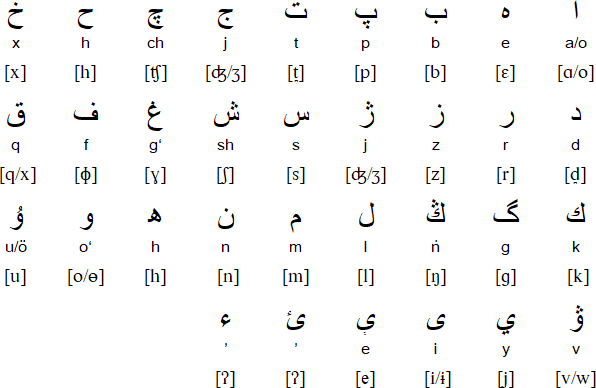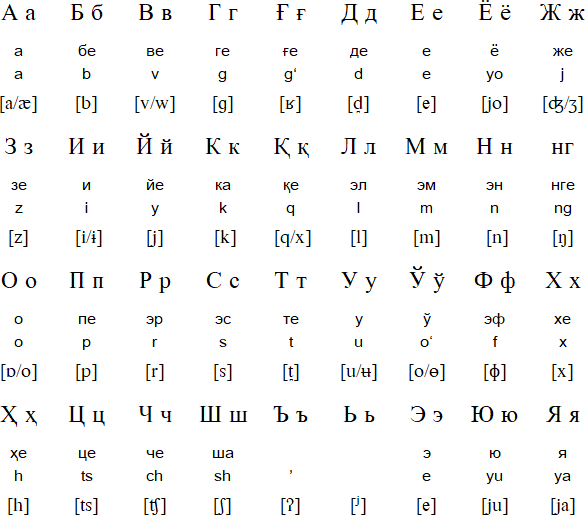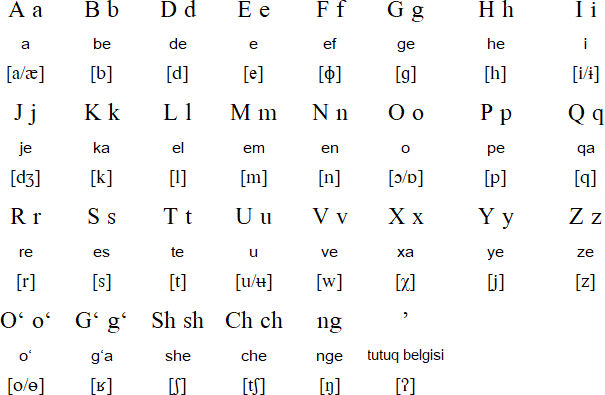Uzbek is a Turkic language spoken by about 30 million people mainly in Uzbekistan, and also in Afghanistan, Turkey. There are two main varieties of Uzbek: Northern Uzbek and Southern Uzbek. They are to some extent mutually intelligible, although there are differences in grammar and vocabulary.
Northern Uzbek (ўзбек тили / oʼzbek tili) is spoken mainly in Uzbekistan, and also in Tajikistan, Kyrgyzstan, Turkemenistan, Kazakhstan and China. There are 22.2 million speakers of Northern Uzbek in Uzbekistan (in 2015), 927,000 in Tajikistan (in 2012), 840,000 in Kyrgyzstan (in 2014), 478,000 in Turkmenistan (in 2015), 436,000 in Kazakhstan (in 2009) and 5,000 in China (in 2000). There are also about 400,000 speakers of Uzbek in Russia. The language is taught in schools and used in the media in Uzbekistan. It is also known as o'zbek, o'zbekcha or Özbek.
Since the 1990s fluency in Uzbek has been a requirement for citizenship of Uzbekistan, and also for government jobs. There has also been a trend to replace Russian and other international words with their Turkic equivalents.
Southern Uzbek (ﯣزبېک [oʼzbek]) is spoken mainly in northern Afghanistan. In 2011 there were about 2.9 million speakers in Afghanistan, and another 3,800 speakers in Turkey. Southern Uzbek is written with the Arabic script, is taught in schools, and used in literature and the media. It is also known as O'zbek, Usbeki, Uzbak or Uzbeki.
An early form of Uzbek, known as Chagatai (one of the sons of Genghis Khan) and written with the Arabic script, emerged as a literary language in the 14th century. A version of the Latin alphabet replaced the Arabic script in 1927, and was in turn replaced by the Cyrillic alphabet in 1940.
In 1993 the government of Uzbekistan decided to switch to the Latin alphabet, and the alphabet shown below has been in use since 1995. The Cyrillic alphabet is still widely used, however, particularly for adverts and signs. Some publications, such as newspapers, use a mixture of the Cyrillic and Latin alphabets. The Arabic alphabet is still used in Afghanistan and China.



In Russian loanwords, j is pronounced [ʒ] and o is pronounced [o].
Corrections by Anıl Öztürk
Hear how to pronounce Uzbek:
Download alphabet charts for Uzbek (Excel)
.بهرچه آدهملهر ئېرکىن، قهدر-قىممهت ۋه هۇقۇقلهرده تېڭ بولىب تۇغىلهدىلهر. ئۇلهر ئهقل ۋه وىجدان ساهىبىدىرلهر ۋه بىر-بىرلهری ئىله بىرادهرلهرچه مۇئامهله قىلىشلهری زهرۇر
Барча одамлар эрҝин, қадр-қиммат ва ҳуқуқларда танг бўлиб туғиладилар. Улар ақл ва виждон соҳибидирлар ва бир-бирларига биродарларча муомала қилишлари зарур.
Barcha odamlar erkin, qadr-qimmat va huquqlarda teng boʻlib tugʻiladilar. Ular aql va vijdon sohibidirlar va bir-birlari ila birodarlarcha muomala qilishlari zarur.
/bart͡ʃa ɒd̪amlar erkɪn, qad̪r-qɨmmat̪ va huquqlard̪a t̪eŋ bɵlɨp t̪uʁɨlad̪ɨlar. ular aql va vɪd͡ʒd̪ɒn sɒhɨbɨdɨrlar va bɨr-bɨrlarɨ ila bɨrɒdarlart͡ʃa muɒmala qɨlɨʃlarɨ zarur./
All human beings are born free and equal in dignity and rights. They are endowed with reason and conscience and should act towards one another in a spirit of brotherhood.
(Article 1 of the Universal Declaration of Human Rights)
Information about Uzbek | Phrases | Numbers | Tower of Babel | Books about Uzbek on: Amazon.com and Amazon.co.uk [affilate links]
Information about the Uzbek language
http://en.wikipedia.org/wiki/Uzbek_language
https://en.wikipedia.org/wiki/Uzbek_alphabet
https://www.orexca.com/uzbekistan/uzbek_language.htm
https://www.ethnologue.com/language/uzn
https://www.ethnologue.com/language/uzs
http://factsanddetails.com/central-asia/Uzbekistan/sub8_3d/entry-4699.html
Online Uzbek lessons
http://en.wikibooks.org/wiki/Uzbek_language
http://home.unilang.org/wiki3/index.php/Uzbek_lessons
http://www.languageinstitute.wisc.edu/cails/lessons.html
http://polymath.org/uzbek.php
Uzbek phrases
https://en.wikivoyage.org/wiki/Uzbek_phrasebook
https://mylanguages.org/uzbek_phrases.php
https://www.pinhok.com/kb/uzbek/1111/20-uzbek-phrases-you-can-use-immediately/
Learn Turkic languages - Turkish, Turkmen and Uzbek
http://www.xs4all.nl/~iamback/turkic/
Online Uzbek dictionaries
http://www.uzbek-dictionary.com
http://www.ismanov.com
Online Uzbek radio
http://www.bbc.co.uk/uzbek/
http://www.ozodlik.org
Altay, Äynu, Azerbaijani, Bashkir, Chagatai, Chelkan, Chulym, Chuvash, Crimean Tatar, Dolgan, Fuyu Kyrgyz, Gagauz, Ili Turki, Karachay-Balkar, Karaim, Karakalpak, Karamanli Turkish, Kazakh, Khakas, Khalaj, Khorasani Turkic, Krymchak, Kumandy, Kumyk, Kyrgyz, Lop, Nogai, Old Turkic, Qashqai, Romanian Tatar, Salar, Shor, Siberian Tatar, Soyot, Tatar, Teleut, Tofa, Turkish, Turkmen, Tuvan, Urum, Uyghur, Uzbek, Western Yugur, Yakut (Sakha)
Adamaua Fulfulde, Afrikaans, Arabic (Algerian), Arabic (Bedawi), Arabic (Chadian), Arabic (Egyptian), Arabic (Gulf), Arabic (Hassaniya), Arabic (Hejazi), Arabic (Lebanese), Arabic (Libyan), Arabic (Modern Standard), Arabic (Moroccan), Arabic (Najdi), Arabic (Sudanese), Arabic (Syrian), Arabic (Tunisian), Arwi, Äynu, Azeri, Balanta-Ganja, Balti, Baluchi, Beja, Belarusian, Bosnian, Brahui, Chagatai, Chechen, Chittagonian, Comorian, Crimean Tatar, Dargwa, Dari, Dhatki, Dogri, Domari, Gawar Bati, Gawri, Gilaki, Hausa, Hazaragi, Hindko, Indus Kohistani, Kabyle, Kalkoti, Karakalpak, Kashmiri, Kazakh, Khowar, Khorasani Turkic, Khwarezmian, Konkani, Kumzari, Kurdish, Kyrgyz, Lezgi, Lop, Luri, Maba, Maguindanao, Malay, Malay (Terengganu), Mandinka, Marwari, Mazandarani, Mogholi, Morisco, Mozarabic, Munji, Noakhailla, Nubi, Ormuri, Palula, Parkari Koli, Pashto, Persian/Farsi, Punjabi, Qashqai, Rajasthani, Rohingya, Salar, Saraiki, Sawi, Serer, Shabaki, Shina, Shughni, Sindhi, Somali, Soninke, Tatar, Tausūg, Tawallammat Tamajaq, Tayart Tamajeq, Ternate, Torwali, Turkish, Urdu, Uyghur, Uzbek, Wakhi, Wanetsi, Wolof, Xiao'erjing, Yidgha
Abaza, Abkhaz, Adyghe, Aghul, Akhvakh, Akkala Sámi, Aleut, Altay, Alyutor, Andi, Archi, Assyrian / Neo-Assyrian, Avar, Azeri, Bagvalal, Balkar, Bashkir, Belarusian, Bezhta, Bosnian, Botlikh, Budukh, Bulgarian, Buryat, Chamalal, Chechen, Chelkan, Chukchi, Chulym, Chuvash, Crimean Tatar, Dargwa, Daur, Dolgan, Dungan, Enets, Erzya, Even, Evenki, Gagauz, Godoberi, Hinukh, Hunzib, Ingush, Interslavic, Itelmen, Juhuri, Kabardian, Kaitag, Kalderash Romani, Kalmyk, Karaim, Karakalpak, Karata, Karelian, Kazakh, Ket, Khakas, Khanty, Khinalug, Khorasani Turkic, Khwarshi, Kildin Sámi, Kili, Komi, Koryak, Krymchak, Kryts, Kubachi, Kumandy, Kumyk, Kurdish, Kyrgyz, Lak, Lezgi, Lingua Franca Nova, Lithuanian, Ludic, Macedonian, Mansi, Mari, Moksha, Moldovan, Mongolian, Montenegrin, Nanai, Negidal, Nenets, Nganasan, Nivkh, Nogai, Old Church Slavonic, Oroch, Orok, Ossetian, Pontic Greek, Romanian, Rushani, Russian, Rusyn, Rutul, Selkup, Serbian, Shor, Shughni, Siberian Tatar, Sirenik, Slovio, Soyot, Tabassaran, Tajik, Talysh, Tat, Tatar, Teleut, Ter Sámi, Tindi, Tofa, Tsakhur, Tsez, Turkmen, Tuvan, Ubykh, Udege, Udi, Udmurt, Ukrainian, Ulch, Urum, Uyghur, Uzbek, Veps, Votic, Wakhi, West Polesian, Xibe, Yaghnobi, Yakut, Yazghulami, Yukaghir (Northern / Tundra), Yukaghir (Southern / Kolyma), Yupik (Central Siberian)
Languages written with the Latin alphabet
Page last modified: 01.06.25
[top]
You can support this site by Buying Me A Coffee, and if you like what you see on this page, you can use the buttons below to share it with people you know.

If you like this site and find it useful, you can support it by making a donation via PayPal or Patreon, or by contributing in other ways. Omniglot is how I make my living.
Note: all links on this site to Amazon.com, Amazon.co.uk
and Amazon.fr
are affiliate links. This means I earn a commission if you click on any of them and buy something. So by clicking on these links you can help to support this site.
[top]